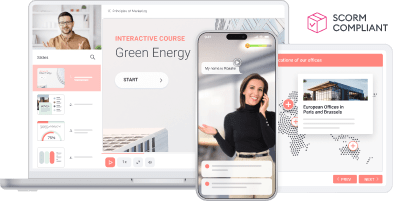The 18 Best Instructional Design Certificate Programs and Courses

Tons of educational organizations and platforms have started offering instructional design certificate programs in the last few years. Why?
Instructional designer is one of the trendiest positions in today’s job market. It’s rewarding, prestigious, and seems to be offering an ideal ratio of routine vs. creative tasks, along with a healthy work-life balance. With a steady shift to remote education and remote work, instructional designers are in high demand, and this trend will continue.
However, if you’re chasing a career in instructional design, it might be hard to figure out what instructional design skills you actually need to learn in order to land such a job. Moreover, for people who are not yet initiated into the mysteries of eLearning, it’s difficult to even guess what sort of tasks an instructional designer carries out on a day-to-day basis.
In short, an instructional designer is someone who is competent in both teaching and creating digital training content. The former requires an understanding of the human psychology responsible for the learning process, while the authoring part might come in very different forms, e.g., knowing how to create a training video, a presentation, a mobile app, or anything that can be used as training material, for that matter.
Although there’s no consensus on whether becoming an instructional designer requires formal training, it goes without saying that a prestigious certificate in instructional design or even a bachelor’s or master’s degree in the field will drastically improve your chances of getting such a position. Thus, in this article, we’ll present you with a list of the best instructional design certificate programs – from free to master’s degree.
How We Selected the Best Paid and Free Instructional Design Certificate Programs and Courses
In selecting trainings, we carefully considered several key criteria:
- Duration. We considered both short-term and long-term options to suit different preferences and time commitments.
- Transfer credit policy. We examined whether the programs accepted credits from previous coursework or experience.
- Tuition fees. We compared the costs across different programs, ensuring that they were reasonable and aligned with the value provided.
- Curriculum. We carefully examined what is included in each program and course. Also, we looked for a diverse range of topics, ensuring that the programs provided comprehensive coverage of instructional design principles and practices.
- Admission requirements. We reviewed the prerequisites and requirements for each program, evaluating the level of difficulty and compatibility with varying educational backgrounds.
- Accreditation of the programs. We ensured that the programs meet certain standards of quality and credibility, which is essential for learners looking for reputable certifications.
By considering these criteria, we were able to identify trainings that best align with the needs of prospective learners.
Comparison of the Best Instructional Design Certificate Programs and Courses
Here’s a comparison chart of all of the instructional design certificate programs and online courses addressed in this article. Check out their details.
| Name | Vendor | Duration | Cost | Best for |
iSpring Academy | 3 hours | $270 (Standard), $570 (Pro) | Aspiring course developers who would like to receive hands-on experience in course creation and secure a job in instructional design right after training. | |
IDOL Courses | 8 weeks | $3,497 | Course developers who are ready to invest their time in mastering tons of software solutions for building online courses and visuals. | |
Digital Learning Institute | 8 weeks | $2,499 | People who are new to digital learning or need baseline knowledge of the fundamentals. | |
University of Wisconsin-Stout | 9 months | $5,712 | This course is ideal for those who already have a bachelor’s degree in a specialized field from an accredited institution and are interested in pursuing an academic education in instructional design. | |
Harvard Extension School | 1.5 years | $13,360 | Individuals who’d like to get comprehensive knowledge of instructional design and go even further by studying programming and website development. | |
6. MicroMasters Program in Instructional Design and Technology | University of Maryland | 8 months | $1,196 | Instructional designers seeking a comprehensive academic background in their field. |
Indiana University Bloomington | 15 hours | $539.60 for Indiana residents and $639.43 for non-residents | Those who’d like to advance a career or prepare for a master’s or doctoral program in instructional systems technology. | |
Ohio University | Not specified | $536 for Ohio residents and $535 for non-residents | Those who want to transition into the field of instructional technology. | |
The University of Arizona Global Campus | 2 years | Not specified | Those who would like to earn a bachelor’s degree in instructional design. | |
10. Online Master’s Degree in eLearning and Instructional Design | Northeastern University | 2 years | $39,800 | Those who would like to receive a master’s degree in instructional design and build a solid portfolio during the training. |
| 11. Masters of Education in Learning, Design and Technology, Instructional Design and Development | University of Georgia | 2 years | $23,220 | Those who are looking to gain extensive knowledge in instructional design and aspire to pursue a master’s degree in this field. |
| Coursera | 17 hours | Free | Individuals who would like to get a basic understanding of instructional design and start developing eLearning courses. | |
| OpenLearning | 17 hours | Free | Individuals who would like to learn the fundamentals of instructional design and create their first eLearning courses. | |
| 14. Gamification | Coursera | 17 hours | Free | Those who would like to develop creative, human-centered, and thoughtful gamification solutions. |
| Udemy | 17 hours | $99.99 | Instructional designers at any level and of any professional experience. | |
| LinkedIn Learning | 45 minutes | $39.99 (for a LinkedIn Premium subscription) | Those who’d like to learn the fundamentals of basic instructional design frameworks | |
| LinkedIn Learning | ~5 hours | $39.99 (for a LinkedIn Premium subscription) | Instructional designers who are fairly comfortable creating simple online training and want to improve their theoretical knowledge of instructional design principles | |
| Udemy | ~21 hours | $79.99 | Individuals who’d like to learn how to write a training curriculum that’s easier to learn and more enjoyable to teach. |
The Best Non-Academic Online Instructional Design Certificate Programs
We’ll start with serious programs that take over 1 month to complete but are not provided by an academic institution. Finishing these programs will earn you an official instructional design certificate, which will make you a much more valuable hire in the eyes of potential employers and greatly increase your chances of landing your dream job.
1. How to Create an Interactive Online Course (iSpring Academy)
Vendor: iSpring Academy
Level: Any
Cost: $270 (Standard), $570 (Pro)
Duration: 3 hours
Certificate: Issued upon successful completion
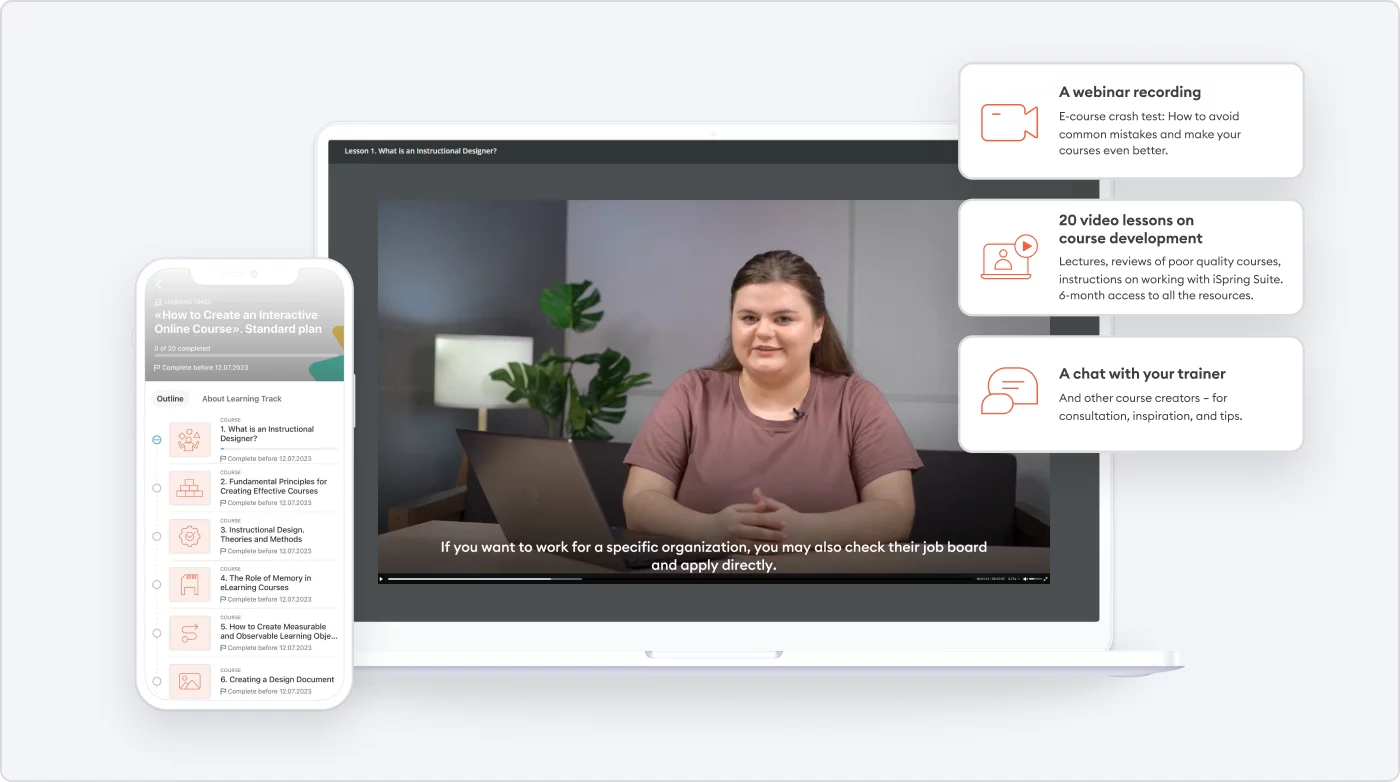
Instructional Design Course by iSpring Academy
This online instructional design certificate program is provided by a world-renowned eLearning software company, iSpring, that has established itself as a reliable eLearning expert in the market.
If you need to learn the practical side of instructional design, this is definitely what you’re looking for. The program includes 20 video lessons that will help you master every stage of course development – from identifying learning objectives and creating a storyboard to perfecting the graphics and publishing your project online.
It starts out with fundamental theories, such as instructional design models and adult learning theory, and then provides a deep dive into eLearning content creation. After the course, you’ll have all the knowledge and skills needed to design effective interactive online courses and assessments.
The course comes in two plans: Standard and Pro. The Standard plan provides you with theory that you can take at a comfortable pace. And the Pro plan additionally allows you to put theory into practice and get hands-on experience by completing practical assignments after every training module. Pro learners complete these tasks with iSpring Suite (they get a 3-month free trial), then receive expert feedback, and polish their work if necessary. By the end of the program, all Pro learners have a ready-made interactive course created under the guidance of a Senior Instructional Designer.
“This is a very dynamic and informative course. What’s even more important is that you can’t take it just to receive the certificate of completion – you’ll have to study really hard to get a passing grade. The result is totally worth it. I use knowledge from the course every day.” (Mackenzie B.)
What you will learn
- Fundamental principles for creating effective courses
- Instructional design methodology
- How to create a design document
- Storyboarding and scripting courses
- How to build pro-looking courses without a graphic designer
- How to design application-based assessments
- The building of interactive role-play simulations
- How to record engaging video lessons
- Online course testing
- How to evaluate the effectiveness of eLearning courses
Best for: Aspiring course developers who would like to receive hands-on experience in course creation and secure a job in instructional design right after completing the training.
2. Instructional Design Academy (IDOL Courses)
Vendor: IDOL Academy
Level: Any
Cost: $3,497
Duration: 8 weeks
Certificate: Issued upon successful completion

Instructional Design Academy by IDOL Courses
The sole entry in the nonacademic subcategory, this is an online training program on instructional design that works as cohort-based learning, with supervision and assistance from the creator of this curriculum, Dr. Robin Sargent. The course promises to provide learners with an adequate amount of theory, stressing the practical application of the acquired knowledge. For example, it should teach you how to record and animate quality training videos.
During the training, you’ll get hands-on experience with a range of authoring tools and other software to bring design concepts to life. They include:
- Articulate Storyline — For designing interactive eLearning experience
- Vyond — For creating 2D animated videos
- Genially — For creating interactive images, infographics, eLearning, and job aids
- Canva — For designing professional-looking graphics, GIFs, slides, and videos
- Camtasia — For recording and editing high-quality videos
The program appears to have a strong social learning element with former graduates and fellow matter experts all taking part in reviewing finished projects, providing feedback on them, and answering questions from students.
“I really enjoyed the IDOL Academy. I have been an Instructional Designer & eLearning Developer for 7 years, but I found the IDOL Academy to be endlessly helpful even this far into my career.” (Sherisse G.)
What you will learn
- Planning, scheduling, budgeting, reporting, and managing risks
- How to use different instructional design methodologies
- Mapping a course plan to learning needs and meeting company goals
- Running productive SME interviews and getting quality learning content
- How to write scripts that are structured and meaningful for learners
- Drafting detailed design blueprints and instructional design documents
- How to craft a storyboard and prepare for eLearning development
- Managing the rollout of new training solutions in a corporate setting
- How to read reports and analytics to identify learning gaps
Best for: Course developers who are ready to invest their time to master tons of software solutions for building courses and visuals.
3. Professional Certificate in Instructional Design (Digital Learning Institute)
Vendor: Digital Learning Institute
Level: Any
Cost: $2,499
Duration: 8 weeks
Certificate: Issued upon successful completion
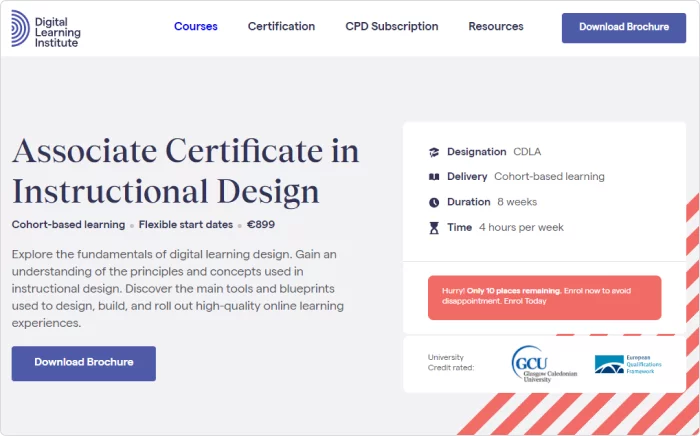
Instructional Design Certificate Program by Digital Learning Institute
This is a globally recognized, industry-approved instructional design certificate program delivered by the Digital Learning Institute (DLI) and credit-rated by Glasgow Caledonian University.
The course promises to provide learners with all the knowledge they need to become professional instructional designers. It covers the fundamentals of digital learning design, core design principles, the systematic instructional design process of creating eLearning content, and hands-on experience using a renowned authoring tool, Articulate Storyline.
During the training, learners work on an actual project, which allows them to apply their knowledge in practice. Learners are also offered monthly live virtual classrooms, during which they can interact with peers and the course tutors. They also have an opportunity to connect with one of their educational professionals post-program to discuss their career and further education needs.
“Even though you may have that knowledge, you might not have the qualification behind you, so I was experiencing the imposter syndrome. DLI definitely helped me progress in my journey within digital learning.” (Alan O’Flaherty)
What you will learn
- How to design, build, and roll out high-quality eLearning
- Core online learning design principles and the underpinning theory, with practice
- How to work seamlessly with SMEs to map out your online learning experiences
- To design a storyboard for an interactive engaging eLearning course
- How to build an eLearning prototype using authoring tools like Articulate Storyline
Best for: People who are new to digital learning or need baseline knowledge of the fundamentals.
The Best Academic Instructional Design Certificate Programs
These are academic programs that take less than two years to complete and can’t offer as much depth as a bachelor’s or a master’s, yet are still highly valuable for employers. It needs to be mentioned here that academic institutions don’t really bother putting reviews of their alumni on display.
4. Instructional Design Certificate – 4 courses (University of Wisconsin-Stout)
Vendor: University of Wisconsin-Stout
Level: Any
Cost: $5,712
Duration: 9 months
Certificate: Issued upon successful completion
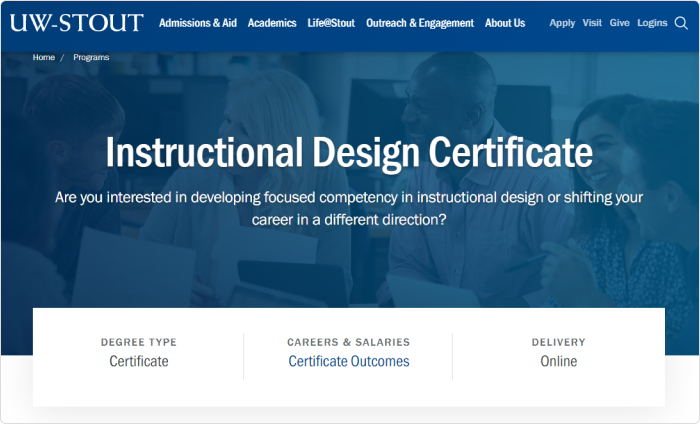
Instructional Design Certificate Program by the University of Wisconsin-Stout
A highly praised and extremely popular instructional design certificate program that consists of 4 courses, each encompassing a broad topic:
- Course 1: Trends and Issues in Instructional Design
- Course 2: Instructional Strategies and Assessment Methods
- Course 3: Designing Computer-Based Training (CBT)
- Course 4: Project Management for Instructional Development
All the courses must be taken in sequence — you need to finish one course in order to take the next one. Each course provides three semester hours of graduate credit. To enroll into the program, you should have a bachelor’s degree from an accredited institution.
These courses are not informal introductory lectures like the ones that can be found on Coursera or Skillshare. Taking an academic certificate program like this one is a legitimate way to become a high-value asset on the instructional design job market, beating applicants who can’t boast such accomplishments to the punch. After finishing the program, each student receives a signed professional certificate with the University of Wisconsin-Stout official seal titled “Graduate Certificate In Instructional Design.”
You will learn
- Designing effective instruction for any delivery method
- How to align instructional activities and assessments
- The application of computer-based training and matching technology tools to instructional problems
- How to evaluate the effectiveness of instructional design
- Management of the systematic instructional design process
- How to tap into career and volunteering instructional design network opportunities
Best for: This course is ideal for those who already have a bachelor’s degree in a specialized field from an accredited institution and are interested in getting an academic education in instructional design.
5. Learning Design and Technology Graduate Certificate (Harvard Extension School)
Vendor: Harvard Extension School
Level: Any
Cost: $13,360
Duration: 1.5 years
Certificate: Issued upon successful completion
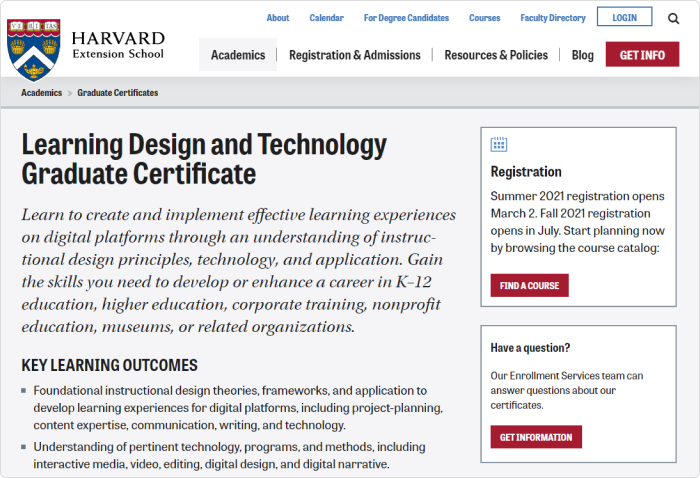
The Learning Design and Technology Graduate Certificate Program by Harvard Extension School
Like the previous program, this one also consists of 4 extensive curriculums that last well over 12 months. Upon successful completion, which requires you to get at least a “B” in each of the required courses, you will receive a professional graduate certificate in “learning design and educational technology.”
The material included in this program teaches a broad range of topics, e.g., “project planning,” “creating and editing interactive training content,” and even “website development.” During this program, you will gain all the skills needed to develop a career in K–12 education, higher education, corporate training, nonprofit education, museums, or related organizations.
What you will learn
- Instructional design theories, frameworks, and their application in developing digital learning experiences, covering project planning, content expertise, communication, writing, and technology skills
- Relevant technology, programs, and methods such as interactive media, video production, editing, digital design, and digital storytelling
- Focused topic areas including website development, web programming, and learning systems for site development
Best for: Individuals who would like to gain a comprehensive understanding of instructional design and go even further by studying programming and website development.
6. MicroMasters Program in Instructional Design and Technology (University of Maryland)
Vendor: University of Maryland
Level: Any
Cost: $1,196
Duration: 8 months
Certificate: Issued upon completion
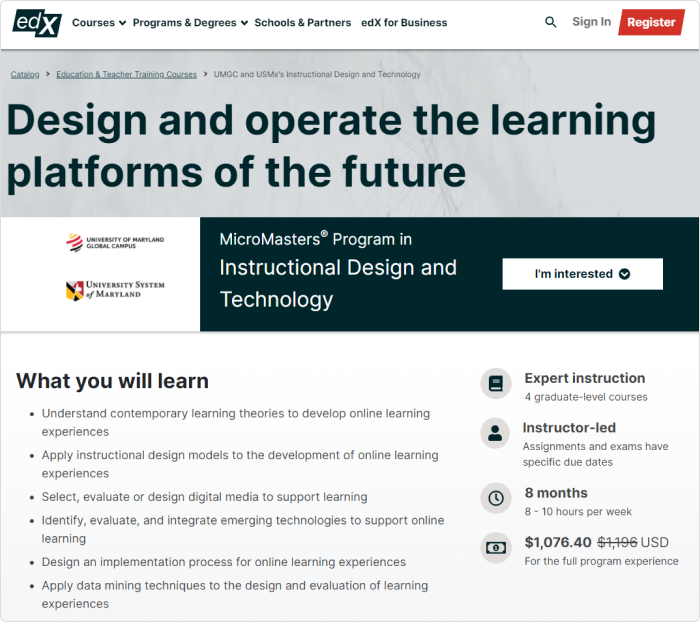
The MicroMasters Program in Instructional Design and Technology by the University of Maryland
Another instructional design program from an online branch of a traditional university, this time labeled as MicroMasters, which is supposed to reflect the comprehensiveness and quality of the material. It promises to teach you the theory and practice of ID, plus additional competencies like data analytics. With an emphasis on preparing students for the challenges of the mobile-oriented online learning world, this program should be worth your while.
This is a four-course certificate program:
- Instructional Design and Technology: Learning Theories
- Instructional Design Models
- Instructional Design: Digital Media, New Tools, and Technology
- Instructional Design Course Evaluation and Capstone Project
The program content and course projects are sequential. In order to pass each of the four required courses in the MicroMasters program, you must earn a grade of 80% or higher.
After you successfully complete this four-course certificate program, you will receive a MicroMasters program certificate. Learners who earn this instructional design certificate may apply for admission to a master’s program, and if accepted, the MicroMasters program certificate will count toward the degree.
What you will learn
- Contemporary and fundamental learning theories for developing online learning experiences
- Relevant technologies that support online learning
- The implementation process for online learning experiences
- Data mining techniques for the design and evaluation of online learning experiences
- The creation of digital media to support online learning
Best for: Instructional designers seeking a comprehensive academic background in their field.
7. Certificate in Instructional Systems Technology (Indiana University Bloomington)
Vendor: Indiana University Bloomington
Level: Any
Cost: $539.60 for Indiana residents and $639.43 for non-residents
Duration: 15 hours
Certificate: Issued upon completion
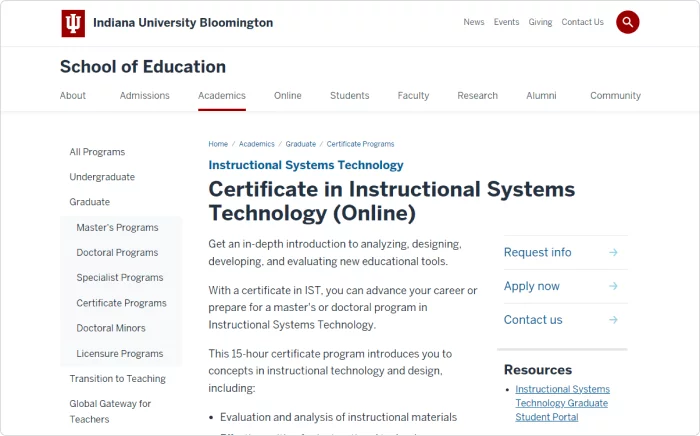
Instructional Systems Technology Certificate Program by Indiana University Bloomington
This instructional design and technology certificate program provides the fundamentals of analyzing, designing, developing, and evaluating educational tools. It introduces you to concepts in instructional technology and design. With a professional certificate in instructional design, you can enhance your professional prospects or prepare for a master’s or doctoral program in learning systems technology.
To enroll in the program, you need to have a bachelor’s degree from an accredited institution and minimum undergraduate GPA of 2.75.
What you will learn
- Evaluation and analysis of instructional materials
- Effective writing for educational technology
- Strategies for computer-mediated learning
Best for: Those who would like to advance their career or prepare for a master’s or doctoral program in instructional systems technology.
8. Online Teaching Knowledge and Skills (Ohio University)
Vendor: Ohio University
Level: Any
Cost: $536 for Ohio residents and $535 for non-residents
Duration: Not specified
Certificate: Issued upon completion
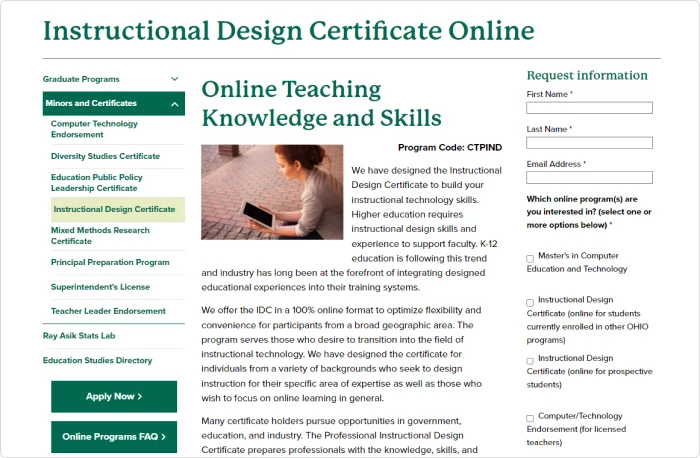
Instructional Design Certificate by OHIO University
This program is designed to help students build instructional technology skills. It is suitable for individuals from diverse backgrounds who want to specialize in designing instruction for their particular field of expertise, as well as those interested in focusing on online learning in general.
Participants who successfully complete the program will receive 9 semester hours of graduate credit. These credits can be used to make progress toward a Master of Education in Computer Education and Technology degree. Alternatively, up to 8 hours can count toward the requirements for the Doctor of Philosophy in Instructional Technology at Ohio University.
What you will learn
- Teaching and learning online
- Principles of instructional design
- The fundamentals of computer education
Best for: Those who want to transition to the field of instructional technology.
The Best Bachelor’s and Master’s Degrees in Instructional Design
The longest, most expensive, and demanding types of programs are a bachelor’s degree and a master’s degree. However, they are usually the ones that give the highest return on your investments and provide you with advanced degrees needed in the field.
9. Bachelor of Arts in Instructional Design (University of Arizona / Ashford)
Vendor: University of Arizona / Ashford
Level: Any
Cost: Not specified
Duration: 2 years
Certificate: Issued upon completion
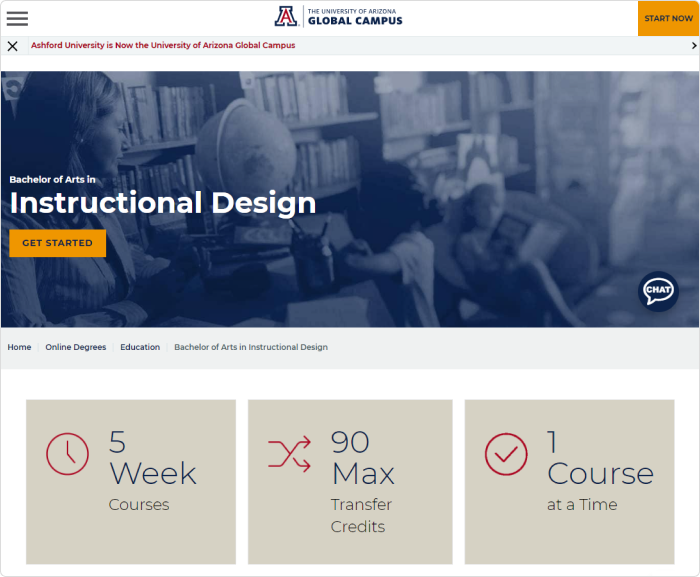
Bachelor’s Program in Instructional Design by the University of Arizona
A bachelor’s program in instructional design from a credible online university is a great starting point for a distinguished career. It will teach you how to apply core learning principles, create digital training content for businesses and other educational settings, use methodologies to successfully manage course development processes in a team, and overcome issues that exist in today’s online educational process.
In order to obtain your bachelor of arts in instructional design, you will need to successfully complete 120 credits. Out of these credits, 30 must be at the upper-division level, with 18 of those credits coming from the major program. Additionally, you must complete a minimum of 30 credits at the University of Arizona Global Campus to fulfill the residency requirement.
What you will learn
- How to design instructional and training interventions and assessments for online, place-based, and blended delivery
- Application of the results of online learning and other analyses to the design of training and instruction
- How to apply evaluations of technologies for developing, delivering, and assessing training interventions
- Distinguishing how different principles and learning theories influence design processes and outcomes
- Management of collaborative processes and participants involved in an instructional design project
- How to respond appropriately to ethical, legal, and political factors that influence ID projects for diverse learners and contexts
Best for: Those who’d like to earn a bachelor’s degree in instructional design.
10. Online Master’s Degree in eLearning & Instructional Design (Northeastern University)
Vendor: Northeastern University
Level: Any
Cost: $39,800
Duration: 2 years
Certificate: Issued upon completion
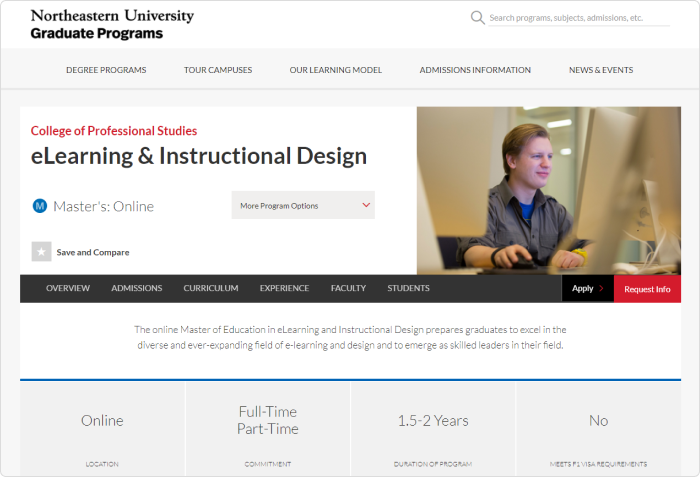
Master’s Program in Instructional Design by the Northeastern University
According to the program overview, an online master’s from Northeastern University would be a strong next step for someone who already works in a higher education, corporate, or non-profit setting. The authors put an emphasis on the importance of practice and creating instructional design projects for your ePortfolio during the entire length of the program. They highlight that enrolling in this master’s degree program should make you a qualified professional in “next-generation and mobile learning.” It is also the most expensive one on this list.
During this course, you will have an opportunity to:
- Create online learning environments that support learners in meeting academic, personal, professional, and/or organizational goals
- Implement innovative ideas using various technologies and modes of design and delivery
- Build a comprehensive online portfolio showcasing your design skills
What you will learn
- Application of learning design models, theories, practices, and technologies to develop engaging environments
- How to demonstrate constructive working relationships and collaborations in a range of professional contexts
- How to redesign online learning experiences to create dynamic educational technology-enhanced and engaging environments
- The ability to effectively present ideas in multiple mediums and to diverse audiences
- How to create learning designs that promote social justice, inclusion, and the building of intercultural and global networks
- To respond innovatively to learning design opportunities and challenges in diverse contexts of different industry sectors
Best for: Those who would like to receive a master’s degree in instructional design and build a solid portfolio during the training.
11. Master of Education in Learning, Design & Technology, Instructional Design & Development (University of Georgia)
Vendor: University of Georgia
Level: Any
Cost: $23,220
Duration: 2 years
Certificate: Issued upon completion

Master’s Program in Instructional Design by the University of Georgia
With 6 semesters of material, this online program is the longest one on our list. The website states that, after completing it, the student will be prepared not just to apply some learning theory to creating Computer-Based Training (CBT), but will have enough hands-on experience to tackle any real-life instructional design challenge. Additional topics include video production, project management, and analytics in instructional design, as well as learning the ropes of team-based project design.
In this online master’s program, you will also gain the knowledge and skills needed to utilize various media creation tools and technologies. With these tools, you will create eLearning modules, video presentations, and other forms of educational content. Additionally, you will study how design approaches like games, simulations, and educational multimedia can enhance the learning experience.
What you will learn
- Introductory instructional system design
- Design thinking and development tools
- How to design interactive learning environments
- Evaluation and analytics in instructional design
- Emerging perspectives on learning, teaching, and educational technology
- Video production for teaching and learning
- Online teaching and learning
- Advanced instructional design
- Team-based design of interactive environments
- Principles of human performance technology and analysis
- Research methods in instructional technology
- Project management in instructional design
Best for: Those who are looking to gain extensive knowledge in instructional design and pursue a master’s degree in this field.
The Best Free Online Instructional Design Courses
This subset includes relatively short (<10 hours) curricula that would be the perfect way to dip your toes in the waters of instructional design. Let’s start with the courses, which are completely free to enroll in and take, but might incur a fee if you’d like to get an instructional design certificate of completion at the end.
12. Learning to Teach Online (Coursera)
Vendor: Coursera
Level: Beginner
Cost: Free
Duration: 17 hours
Certificate: Issued upon completion; $49
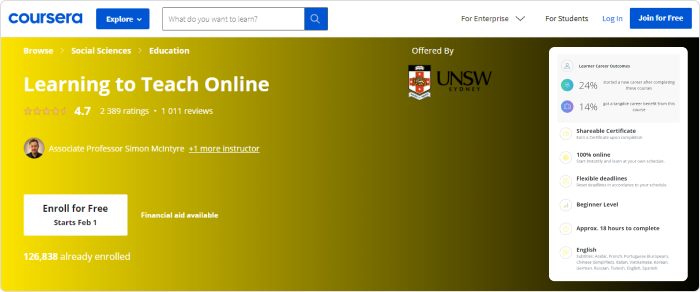
Course on Online Teaching by Coursera
This course from an Art & Design professor at the University of New South Wales is a 5-week curriculum with lots of video content, reading material, self-assessments, and graded assignments. Being largely focused on the theory of learning and explaining certain concepts like the “flipped classroom” and “blended learning,” it reportedly suffers from a lack of practical material, e.g., tutorials on how to work with the actual software used for content authoring.
But, if you’d like to get a professional certificate in instructional design for your LinkedIn profile and you’re interested in the theory of online learning, then you can’t go wrong with this course.
“It was an awesome experience for me in improving, especially my teaching skills to a new paradigm, I learned and benefited immensely from the course, as the course design is meticulously well planned.” (Rajeev R.)
What you will learn
- Why online teaching is important
- Open and institutionally supported technologies
- How to plan online learning
- Online learning activities
- Online assessment strategies
- Open educational resources (OER)
- How to engage and motivate students
- Evaluation strategies
Best for: Individuals who would like to get a basic knowledge of instructional design and start developing eLearning courses.
13. Learning design basics: pedagogy into practice (OpenLearning)
Vendor: OpenLearning
Level: Beginner
Cost: Free enrollment
Duration: 17 hours
Certificate: Upon completion; $40
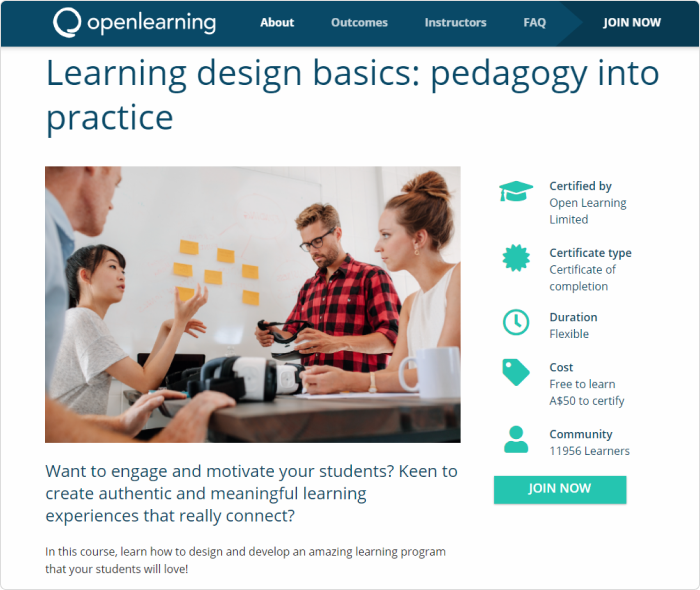
Course on Learning Design Basics by OpenLearning
This is another free-to-enroll training program that talks about the principles of learning design. By taking it, you will improve your understanding of the theory of teaching, e.g., what the most effective way to teach is and what can be done to boost material retention in digital training. The training module itself consists mostly of text with the occasional inclusion of a quiz or a video sample.
It’s important to note that the instructional design certificate given by OpenLearning does not have any international recognition, so it’s best to look for alternatives if you’re after a professional certificate that speaks for itself.
“Thank you for a great learning experience. I have a few more adjustments to make but I now have a design for consultation purposes and eventually, a final product. Good experience and well organized.” (Rebecca S)
What you will learn
- Educational learning philosophy and pedagogy for deep learning
- Evaluation of learning experiences based on how much they could facilitate deep learning
- How to identify the parameters and critical features relevant to a learning situation and students
- How to determine the needs, interests, and motivations of learners in a learning program
- How to design a learning program structure
- Design thinking
- How to write measurable learning outcomes
- Development of a learning program’s content
- How to design creative, authentic, and meaningful activities that align with learning outcomes
- Review and evaluation of the effectiveness of a learning program
Best for: Individuals who would like to learn the fundamentals of instructional design and create their first eLearning courses.
14. Gamification (Coursera)
Vendor: Coursera
Level: Intermediate
Cost: Free enrollment
Duration: 17 hours
Certificate: Issued upon completion; $95
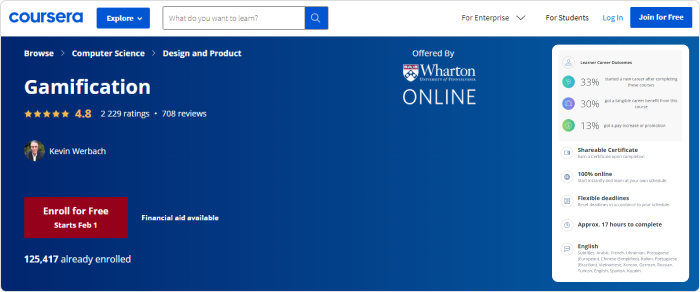
Gamification course by Coursera
This curriculum from Kevin Werbach of the University of Pennsylvania differs from the previous entries in our list. Instead of delving into all concepts and terminology of instructional design, it focuses on a single technique called gamification.
The course explores what gamification is by revealing the psychological mechanisms behind how and why games help people to learn new things. During this course, the student is taught about game design and becomes qualified to apply its principles to non-game contexts, like instructional design.
“Very structured and interesting class about gamification. Kevin is a very engaging teacher and this course was the perfect introduction to gamification. I highly recommend the course.” (Blanka M.)
What you will learn
- The difference between gamification and games
- Deconstructing games
- Motivation and psychology
- How to design a gamification project
- Application of gamification
- Gamification in perspective
Best for: Those who would like to develop creative, human-centered, thoughtful gamification solutions.
The Best Paid Online Instructional Design Courses
The following are paid courses. Payment either takes the form of a monthly subscription, as is the case with the courses offered through LinkedIn Learning, or a per-course fee, as with Udemy.
15. Instructional Design for eLearning (Udemy)
Vendor: Udemy
Level: Beginner
Cost: $99.99
Duration: 17 hours
Certificate: Issued upon completion
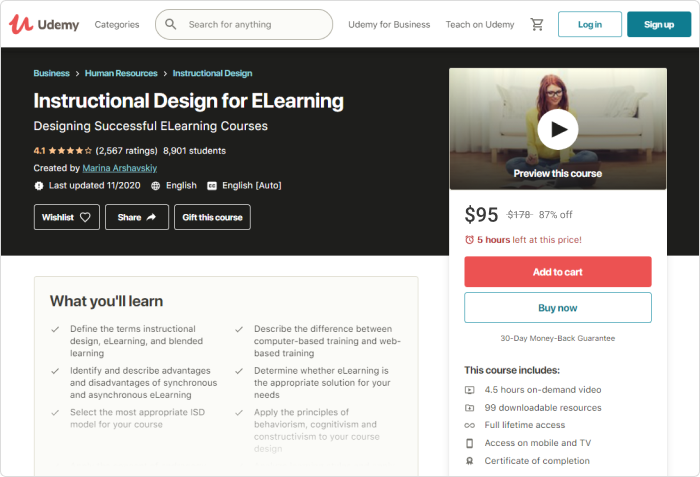
Instructional Design by Udemy
This is another short introductory course for aspiring instructional designers. Despite its length, the author manages to fit in quite a lot of theory, which comes at the expense of practice. Still, despite its flaws, it should be a good starting point for those who’d like to get acquainted with instructional design terminology, create their first digital training course, and get hands-on experience with authoring tools.
“I’m a novice in instructional design. This course did give an insight into what instructional design is all about. It is a good course for beginners.” (John D.)
What you will learn
- To apply the concept of andragogy and Malcolm Knowles’s six principles of adult learning theory to course design
- Design and development of storyboards and prototypes for your course
- Application of Kirkpatrick’s Four Levels of Evaluation to eLearning courses
- How to develop courses in Articulate and Adobe Captivate
- To design screencasts for your technical training courses
- How to create podcasts and vodcasts for eLearning
- The creation of a design document with appropriate sections and information in each section
- How to script your eLearning courses using plain language principles and style guides
- The use of guidelines for creating SCORM-compliant content
- How to design Section 508-compliant training materials
Best for: Instructional designers at any level and of any professional experience.
16. Instructional Design Essentials: Models of ID (LinkedIn Learning)
Vendor: LinkedIn Learning
Level: Intermediate
Cost: $39.99 (for a LinkedIn Premium subscription)
Duration: 45 minutes
Certificate: Issued upon completion
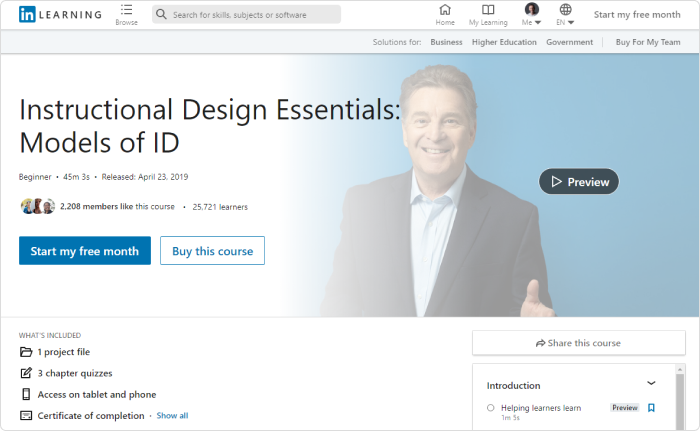
Instructional Design Course by LinkedIn Learning
A very quick video-based course in which the author talks about certain methodologies like ADDIE that are used by instructional designers in order to create engaging training content. Recommended for intermediate level learners that already have experience in authoring eLearning content.
Unfortunately, there are no user reviews for courses on LinkedIn Learning, but, since its initial release in 2019, this curriculum has received over 2,000 likes from the 24,000 students who took it.
What you will learn
- What instructional design is
- The essentials of the ADDIE model
- ADDIE alternatives
- The essentials of the SAM model
- Choosing the right instructional design model
Best for: Those who want to learn the fundamentals of instructional design frameworks.
17. Advancing Your Skills As an L&D Professional (LinkedIn Learning)
Vendor: LinkedIn Learning
Level: Intermediate
Cost: $39.99 (for a LinkedIn Premium subscription)
Duration: ~5 hours
Certificate: Issued upon completion
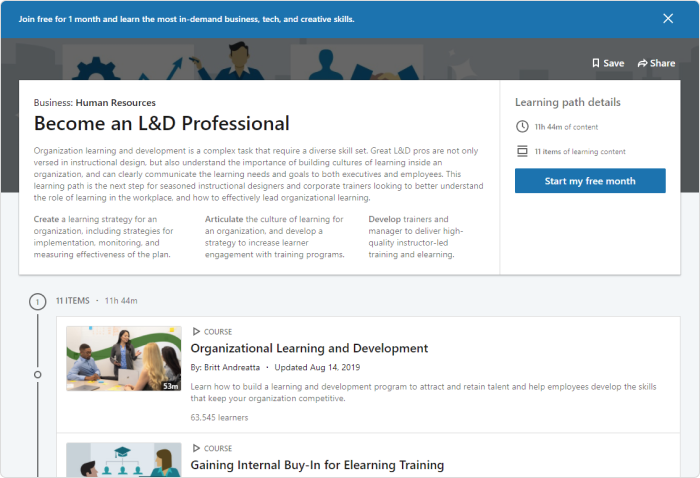
L&D Course by LinkedIn Learning
Unlike all other curricula in this subcategory, this one is a learning path that comprises 8 video courses from 8 authors with information on several distinct directions of learning and professional eLearning development. The lessons included in each course encompass instructions on how to measure learning effectiveness, increase learner engagement, and gamify training experience.
What you will learn
- How to foster engagement and establish a sense of purpose in employees by creating a culture of learning
- How to build a successful learning program
- The setting and managing of realistic expectations for your L&D program
- How to design the learner’s journey
- Creation of inclusive learning experiences
- How to motivate your team to learn
- How to leverage the power of data to design more effective learning content
- Practical success metrics in your training program
Best for: Instructional designers who are fairly comfortable creating simple online training and want to improve their theoretical knowledge of instructional design principles.
18. Instructional Design Pro: Parts 1,2,3 (Udemy)
Vendor: Udemy
Level: Intermediate
Cost: $79.99
Duration: ~21 hours
Certificate: Issued upon completion
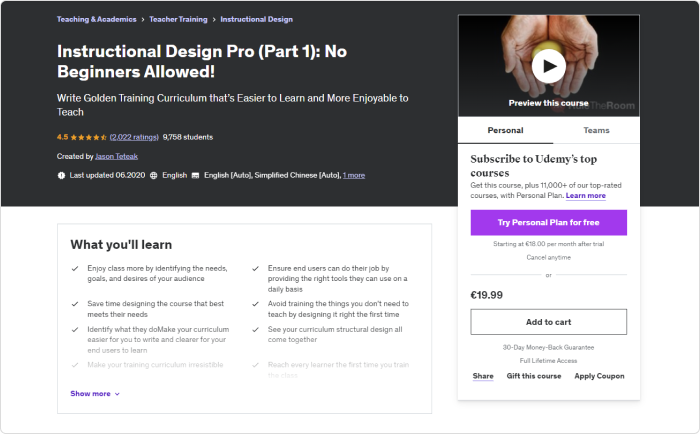
Instructional Design Course by Udemy
Jason Teteak, the creator of this 3-part course, claims to be an in-the-trenches trainer who knows how ID works from hands-on experience as opposed to “theorists” who lecture on training methods that they have never implemented.
It comprises 54 training videos, 18 practical assignments, and 18 quizzes, plus some additional material like a 405-page-long learner workbook, so it seems to be a pretty solid curriculum. However, some user reviews point out that the author often fails to deliver engaging learning experiences while using slightly outdated material.
“Finally I have taken an instructional design course that includes practical examples, basically, it includes the what, how, and why.” (Rowan L.)
What you will learn
- How to create stellar content for all 3 stages of instructional design
- 8 audience-centered building blocks you need to succeed as an instructional designer
- The 9 critical teaching strategies and the 13 essential teaching tools of a successful lesson
- Development of training materials: facilitator guides, learner workbooks, in-class activities, assessments, slideshows, evaluation surveys, and marketing materials
Best for: Individuals who’d like to learn how to write a training curriculum that’s easier to learn and more enjoyable to teach.
Tips on Choosing the Instructional Design Program That’s Best for You
Here are a few valuable tips to help you select the ideal instructional design course or technology program:
- Know your goals. Completing a master’s degree program in instructional design should allow you to land a lucrative job in the field. However, getting a degree requires time, money, and effort that can be spent elsewhere if all you’re looking for is an introduction to the instructional designer position. In this case, it would be best to go with a 5-hour course that you can drop at any time. Alternately, if your dream is to become a high-level specialist in instructional design, don’t waste your time on free online courses with outdated material, but invest in a good master’s degree program instead.
- Plan your budget. Good education gets costly – that’s just how it is. Don’t be afraid to tighten your belt temporarily if the tuition you’re saving for promises a thousandfold return on your investments.
- Get practical. The rule of thumb is that you should go for the program that offers the most hands-on approach to instructional design. The job of instructional design involves coming up with course scenarios, getting information from subject matter experts (SMEs) and putting it all together using a variety of authoring tools in a way that is both engaging and challenging for learners. Sure, it’s always good to be well-versed in training theory, psychology behind the process of distance learning, etc., but in the end, you will need actual authoring experience most, not abstract knowledge.
- Check reviews from alumni. Feedback from former students can provide a lot of insight into the actual qualities of the instructional technology program you’re about to enroll in. Always be skeptical about too much praise or extreme negativity and expect the truth to be somewhere in the middle.
What Else Do You Need to Become an Instructional Designer?
Once you’ve got the necessary knowledge of instructional design and understand how to create impactful distance learning experiences by completing a certificate program or course, you might want to look for your first instructional design project. But of course, you have to be fully prepared for this important step.
Here are a few useful resources that will help you delve deeper into the world of instructional design:
- Instructional Design: The Art of eLearning Architecture
- Instructional Design Principles: Keys to Authoring eLearning Content
- How to Create an Instructional Design Portfolio that Makes You Shine
- Instructional Designer Salary: 5 Proven Ways to Earn More
- 50 Best Tools for Instructional Designers
- Best Online Learning Platforms for 2023
We’ve also prepared a couple of amazing goodies for you that we hope you’ll find even more helpful. Download them for free:
FAQ
Here you’ll find the most commonly asked questions on instructional design.
1. What is instructional design certification?
Instructional design certification is a formal recognition that an individual has completed a course or program focused on the principles and practices of instructional design. This certification often includes training in creating educational materials, designing digital learning experiences, and utilizing relevant technologies to enhance learning. It serves as a credential that validates the holder’s knowledge and necessary skills needed in the field, making them more attractive to employers and clients.
2. What degree do most instructional designers have?
Most instructional designers typically complete a bachelor’s or master’s degree program in fields such as education, instructional design, educational technology, or a related area. Common advanced degrees include a Bachelor’s or Master’s in Instructional Design, Education, Educational Technology, or Curriculum and Instruction. These programs often cover the foundational theories of distance learning, instructional strategies, and practical applications of design principles.
3. What are the minimum qualifications for an instructional designer?
The minimum qualifications for an instructional designer usually include a bachelor’s degree in a relevant field, such as education, instructional design, or educational technology. Additionally, practical experience in designing and developing instructional materials is often required. Some positions may also require a master’s degree and knowledge of specific eLearning tools, software, and platforms, as well as an understanding of fundamental learning theories and instructional strategies.
4. Can you be an instructional designer without a degree?
Yes, it is possible to become an instructional designer without a formal bachelor’s or master’s degree. Many instructional designers come from diverse backgrounds, including graphic design, teaching, and other areas of expertise. Gaining practical experience, developing a strong professional portfolio, and obtaining certifications or professional training in instructional design can also open doors in the field. However, having a bachelor’s or master’s degree can provide a competitive edge and a more comprehensive understanding of instructional design principles and methodologies.
5. How can I get instructional design experience?
There are several ways to gain instructional design experience. First, you can take online courses or earn certifications in instructional design, which will provide you with theoretical knowledge and practical skills needed. You can also seek out internships or entry-level positions in instructional design departments or organizations. This will provide you with hands-on experience and opportunities to learn from experienced educational professionals. Additionally, you can volunteer to create instructional materials or online courses for non-profit organizations or educational institutions. This will allow you to build a professional portfolio of work and demonstrate necessary skills.
6. How can I land an instructional design job with no experience?
Landing an instructional design job with no experience can be challenging, but isn’t impossible. Start by gaining knowledge and necessary skills needed in instructional design through online courses and certifications. Build a strong portfolio by creating sample instructional design projects, even if they’re not for actual clients. Show your enthusiasm and dedication for the field, and highlight transferable skills such as project management, communication, and problem-solving. Overall, displaying a proactive attitude, a willingness to learn, and a passion for instructional design can help you land your first job in the field.
Conclusion
There are plenty of instructional design certificate programs today. They vary according to their duration, cost, purpose, and material depth. So, whatever your goals in instructional design might be, you should be able to find one that’s right for you.
Are you just starting out in eLearning and instructional design? Then sign up for iSpring’s video course right away! You’ll learn how to create effective online courses from A to Z, engage learners, and help them develop their knowledge and necessary skills.




